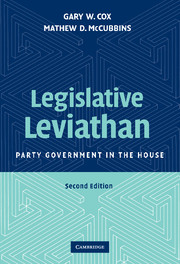Book contents
- Frontmatter
- Contents
- List of Figures
- List of Tables
- Acknowledgments
- Legislative Leviathan
- Introduction
- PART ONE THE AUTONOMY AND DISTINCTIVENESS OF COMMITTEES
- PART TWO A THEORY OF ORGANIZATION
- PART THREE PARTIES AS FLOOR-VOTING COALITIONS
- PART FOUR PARTIES AS PROCEDURAL COALITIONS
- PART FIVE PARTIES AS PROCEDURAL COALITIONS
- Conclusion
- Appendix 1 Uncompensated Seniority Violations, Eightieth through Hundredth Congresses
- Appendix 2 A Model of the Speaker's Scheduling Preferences
- Appendix 3 Unchallengeable and Challengeable Vetoes
- Appendix 4 The Scheduling Power
- Bibliography
- Author Index
- Subject Index
Introduction
Published online by Cambridge University Press: 05 June 2012
- Frontmatter
- Contents
- List of Figures
- List of Tables
- Acknowledgments
- Legislative Leviathan
- Introduction
- PART ONE THE AUTONOMY AND DISTINCTIVENESS OF COMMITTEES
- PART TWO A THEORY OF ORGANIZATION
- PART THREE PARTIES AS FLOOR-VOTING COALITIONS
- PART FOUR PARTIES AS PROCEDURAL COALITIONS
- PART FIVE PARTIES AS PROCEDURAL COALITIONS
- Conclusion
- Appendix 1 Uncompensated Seniority Violations, Eightieth through Hundredth Congresses
- Appendix 2 A Model of the Speaker's Scheduling Preferences
- Appendix 3 Unchallengeable and Challengeable Vetoes
- Appendix 4 The Scheduling Power
- Bibliography
- Author Index
- Subject Index
Summary
Congress is a collection of committees that come together periodically to approve one another's actions.
Clem Miller, Member of the HouseScholars who compare political parties invariably conclude that American parties are much weaker than their European counterparts: they are much less cohesive on legislative votes; their influence over the flow of legislation is less complete; they control but a small fraction of campaign money; they exercise almost no control over nominations; the list could go on. Within the American context, observers have commonly concluded that parties influence legislators less than pressure groups, political action committees, or constituents. Much of the literature of the 1970s and 1980s, moreover, was devoted to the thesis that American parties were declining – both in the electoral and the legislative arenas. In the literature dealing with Congress, assessments of parties sometimes came close to denying their importance entirely: “Throughout most of the postwar years, political parties in Congress have been weak, ineffectual organizations…. In many ways …[they] have been ‘phantoms’ of scholarly imagination that were perhaps best exorcised from attempts to explain congressional organization, behavior, and process” (Dodd and Oppenheimer 1977, 41).
If parties are so weak, then what are the organizing principles of American politics? The literature provides a ready stock of answers: In the electoral arena, it is the individual candidates who have the most powerful organizations, who collect the most money, and who define the course of electoral campaigns.
- Type
- Chapter
- Information
- Legislative LeviathanParty Government in the House, pp. 1 - 14Publisher: Cambridge University PressPrint publication year: 2007



